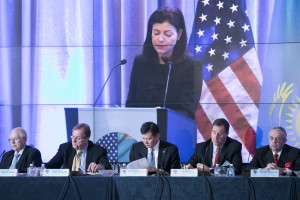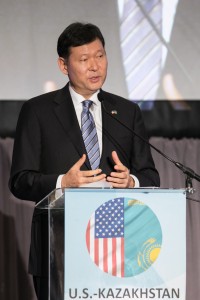 Relations between the U.S. and Kazakhstan are strong and will continue to grow stronger as mutual interests will continue to push the two countries together into an ever closer and wide-ranging strategic partnership, U.S. and Kazakh officials, members of both parliaments, scholars and business leaders noted during a conference in Washington, DC, on Dec. 11.
Relations between the U.S. and Kazakhstan are strong and will continue to grow stronger as mutual interests will continue to push the two countries together into an ever closer and wide-ranging strategic partnership, U.S. and Kazakh officials, members of both parliaments, scholars and business leaders noted during a conference in Washington, DC, on Dec. 11.
The one-day United States – Kazakhstan Convention at the Hyatt Regency Hotel brought together several dozen members of the U.S. Congress, administration officials, members of the Kazakh Parliament, as well as business and think-tank leaders. The Embassy of Kazakhstan in the United States, the Turkic American Alliance, the Council of Turkic American Associations, the Kazakh American Friendship Council, the Turquoise Council of Americans and Eurasians, and Newsdesk Media sponsored the event.
More than a dozen members of Congress spoke at the convention, opened by Kazakhstan’s Ambassador to the United States Kairat Umarov, emphasizing the growing ties between the two countries and highlighting their own experiences with the Central Asian nation.
Speaking at the first session of the convention focusing on the strategic partnership, U.S. Senator Kelly Ayotte, a Republican from New Hampshire, identified security and human rights as critical shared interests between the two countries. She commended Kazakhstan for its role as the 2010 chair of the Organization for Security and Co-operation in Europe and in the NATO Partnership for Peace Programme, in addition to hosting the P5+1 negotiations with Iran over its nuclear programme earlier in 2013.
Richard Hoagland, Principal Deputy Assistant Secretary of State for South and Central Asia, in his remarks spoke about why the U.S.-Kazakhstan relationship matters for both countries.
“Looking back over the past two decades, it is easy to see that Kazakhstan has consistently overcome the challenges it has faced,” Hoagland, who had served as U.S. Ambassador in Astana, said. “But at the moment of independence, Kazakhstan’s future success was not at all predestined. It was a landlocked state that had not at all been seeking the independence that history unexpectedly thrust upon it. In the immediate wake of independence, Kazakhstan’s national leadership made three fundamental decisions that have paid off increasingly handsomely: 1) to pursue fundamental economic reforms, 2) to give up the fourth-largest nuclear arsenal in the world, and 3) to give highest priority to educating a new generation to ensure that Kazakhstan would eventually take its rightful place on the world stage.”
According to Hoagland, “Kazakhstan’s openness to economic partnership with the United States has helped the country achieve the highest per-capita foreign investment among members of the Commonwealth of Independent States. U.S. interest in the Kazakh economy will only increase as Kazakhstan finalizes its WTO accession. As Kazakhstan continues to develop a sound regime of intellectual property rights, introduces WTO and OECD standards, and ensures the even application of laws and regulations, investment in a broad range of sectors outside of energy should grow.”
As an example of U.S.-Kazakhstan ties in nuclear security, Hoagland recalled a recent joint project which secured hundreds of nuclear weapons worth of nuclear materials. “In 2010, our two countries, with the assistance of the Russian Federation, Ukraine, and the United Kingdom, transported highly enriched uranium and plutonium from the closed BN-350 nuclear reactor in Aktau to a secure long-term storage facility. This move insured that the fissile material in question – sufficient to make hundreds of nuclear weapons – could never fall into the wrong hands. I was present at that new storage facility for the opening ceremony – and I will never forget the deep emotion of that moment,” he said.
Turning to education and people-to-people contacts, Hoagland reserved special praise for the Bolashak (Future) scholarship programme and Astana’s efforts to reform civil service.
“We share Kazakhstan’s commitment to develop its human capital. We are proud to have hosted hundreds of Kazakhstani students who have since returned to serve their country,” the U.S. diplomat said. “Of course, it is one thing to educate – it is another to ensure that an education is put to good use. Through its on-going civil service reform, Kazakhstan is reducing the influence of patronage in its government-appointee system, creating a merit-based senior executive service whose members have passed a rigorous examination process. The Civil Service Agency has signed an MOU with our own Office of Personnel Management, and a class of new senior civil servants will be spending a semester in the United States, partly at Duke University and partly at OPM’s Federal Executive Institute in Charlottesville. Through this and other ventures, the United States remains committed to continuing to work with Kazakhstan to foster democracy and good governance.”
The convention’s second session emphasized the long-term Strategy “Kazakhstan 2050”. Dr. Kerri-Ann Jones, U.S. Assistant Secretary of State for Oceans and International Environmental and Scientific Affairs, noted knowledge sharing in science and technology as particularly important to the strategy. She showcased Nazarbayev University’s partnership with leading U.S. higher education institutions, including Duke University, Carnegie Mellon, the University of Pennsylvania, the University of Pittsburgh, and the University of Wisconsin. She also talked about the importance of science and technology cooperation in meeting the demands of the 21st century.
“Our relationship in science, technology and innovation goes far beyond the pursuit of knowledge – it is a key component to strengthening our overall bilateral relationship,” she said. “It brings our scientific communities together and it links our businesses. Science is based on disciplines and values that transcend politics, languages, cultures, and borders.”
Jones went on to list several specific results of bilateral collaboration.
“Kazakh scientists and researchers at the U.S. Department of Agriculture worked together to develop an experimental Hepatitis C vaccine. Your scientists, working with the U.S. Environmental Protection Agency researchers, developed a method to purify mercury-contaminated water,” she said.
In June 2013, an inaugural joint committee meeting under the 2010 U.S.-Kazakhstan Science and Technology Agreement took place in Astana and identified shared priorities and established three working groups in the areas of biomedical research, green chemistry, and natural resources and mineral management. In all three directions there has been specific progress already, the U.S. official noted.
Additionally, the U.S. National Institutes of Health has been working with Kazakh scientists for many years in biodiversity and natural products. “Kazakhstan has unique plant species with potential as anti-cancer drug candidates. … NIH is interested in working with Kazakhstan to help preserve the areas where they grow as “bio-repositories.” A bio-repository would put Kazakhstan at the forefront of drug discovery and preservation of unique ecosystems,” Jones said.
In addition to members of Congress and State Department officials, convention speakers included Atlantic Council President Fred Kempe, Johns Hopkins University’s Central Asia and Caucasus Institute founding chairman Fred Starr, former Deputy Assistant Secretary of Defense David Sedney, experts from Heritage Foundation, Carnegie Endowment, as well as executives from General Electric, Adrian Smith + Gordon Gill Architecture and IMF officials. Senator Serik Nugerbekov led a Kazakh delegation which focused on Astana Economic Forum, EXPO 2017 and other initiatives.
